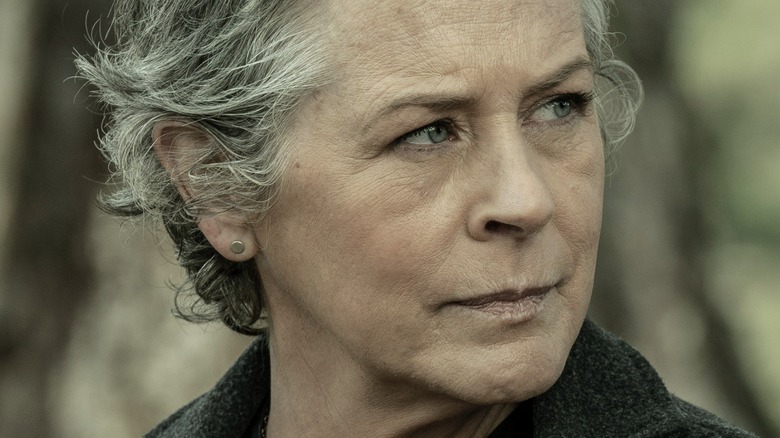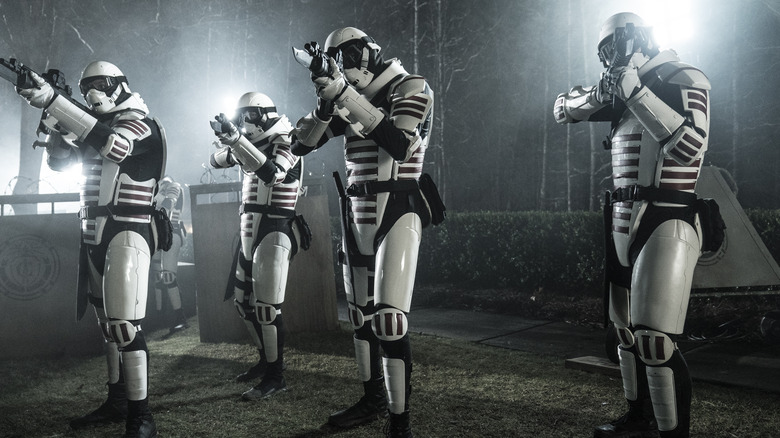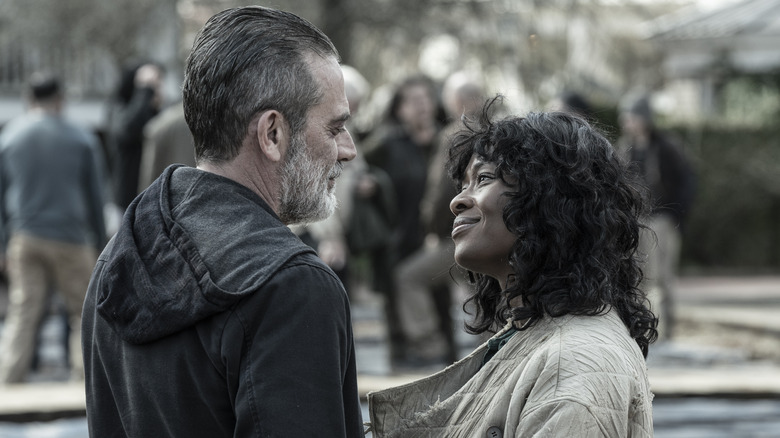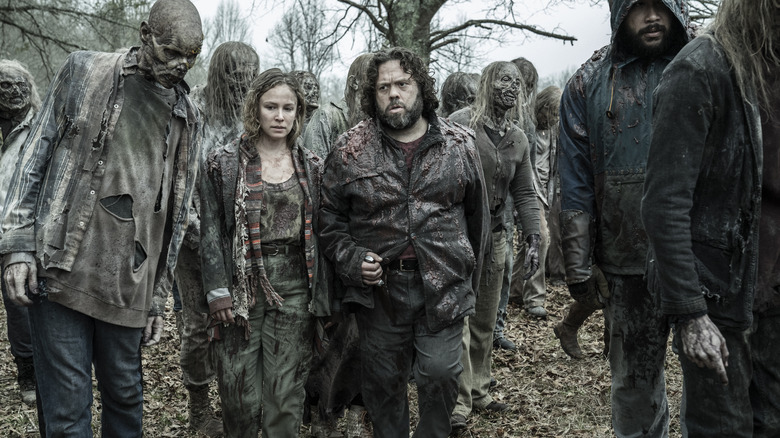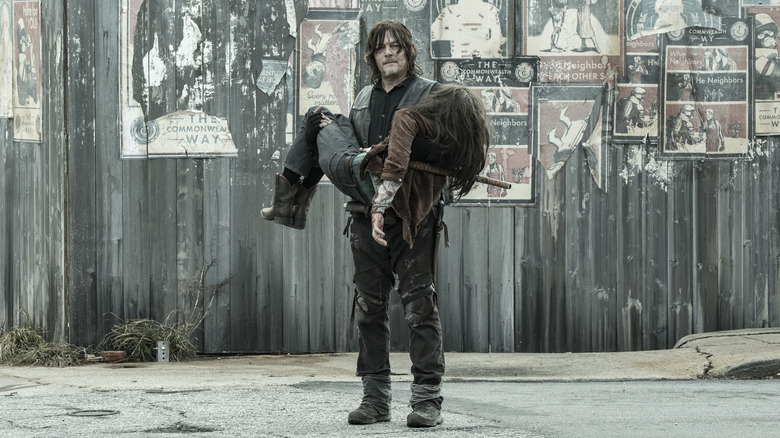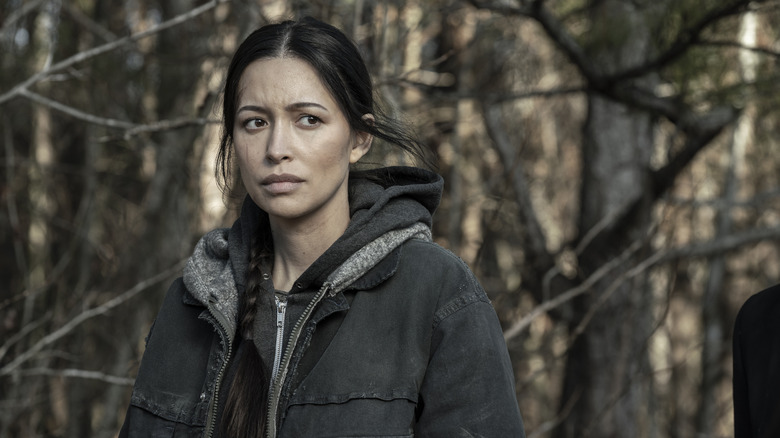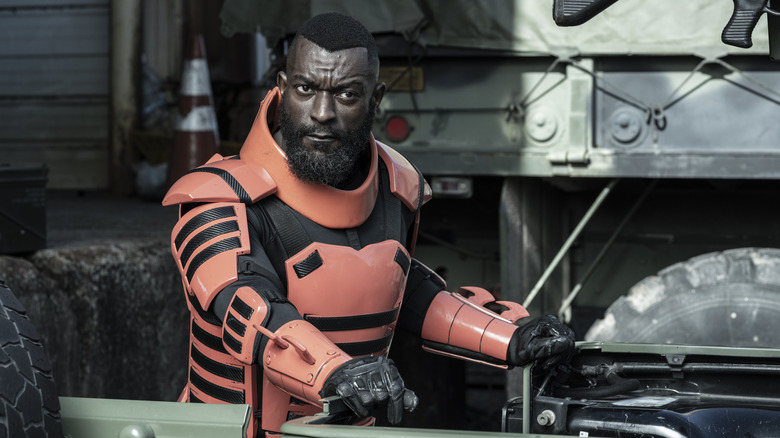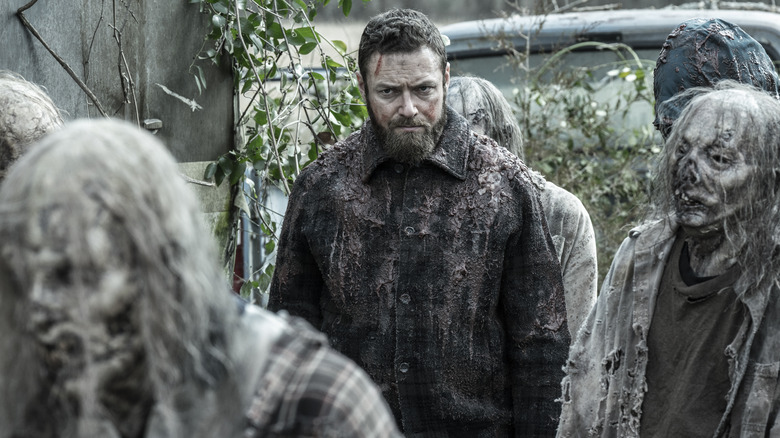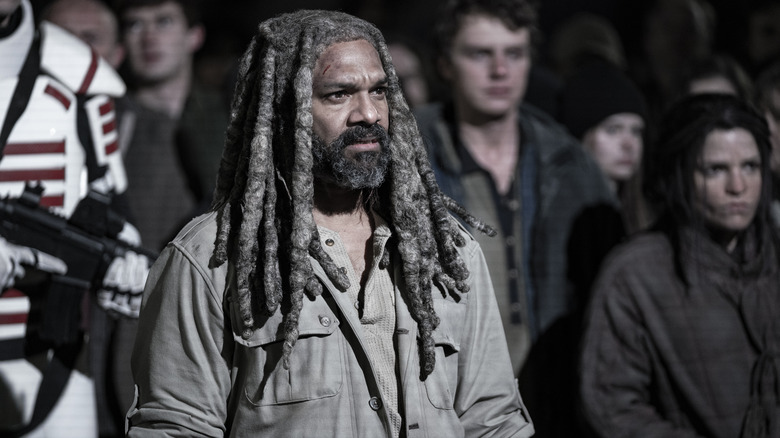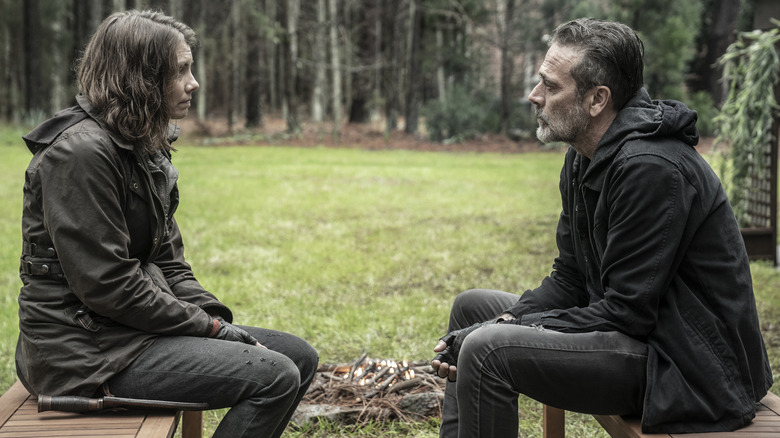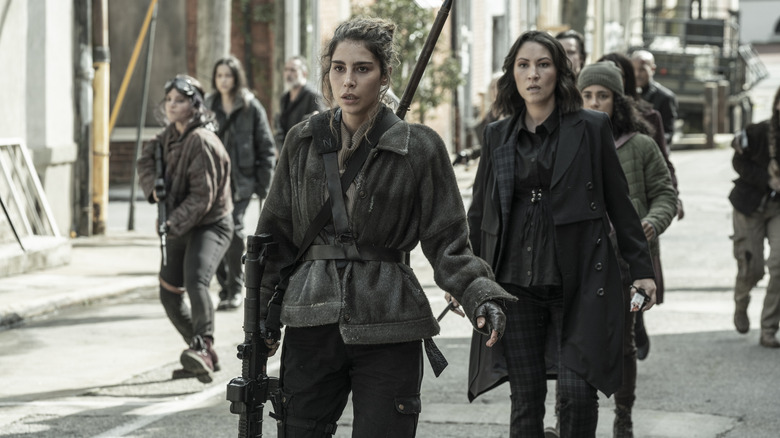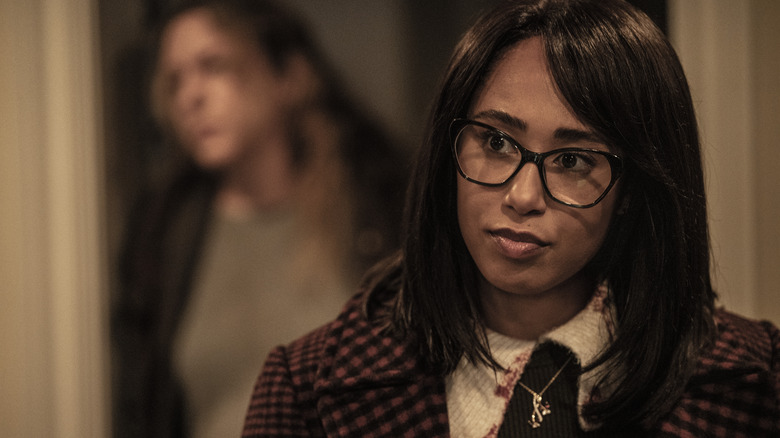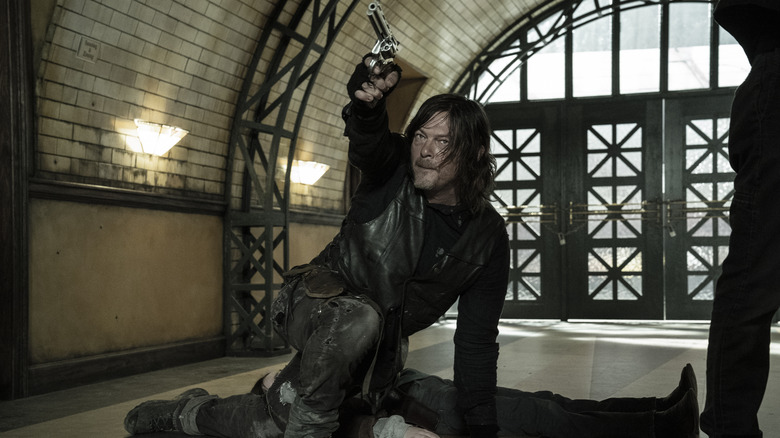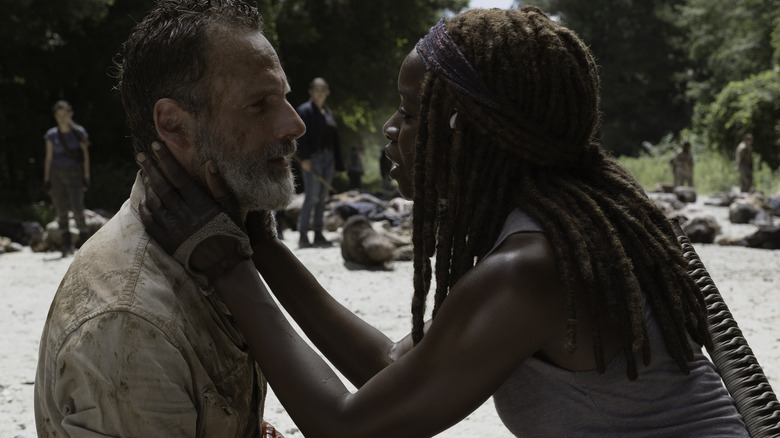The Ending Of The Walking Dead Season 11 Part 3 Explained
The main series of "The Walking Dead" has drawn to a close, wrapping with the 24th episode of its 11th season, appropriately titled "Rest in Peace." When series stalwarts like Rick (Andrew Lincoln) and Michonne (Danai Gurira) set sail with the 9th season, the story continued as more of an ensemble cast, granting long-time supporting characters like Daryl (Norman Reedus), Carol (Melissa McBride), and Rosita (Christian Serratos) a well-deserved spotlight. Though the assurance of spin-offs to come may assuage the hearts of some fans, even those announcements necessarily come with a tinge of bittersweet as we bid farewell to some of the major players of the franchise that we've come to know and love — at least, for now.
On the plus side, the finale wasn't afraid to get sentimental and give (most) of its characters a happy ending, albeit a temporary one as we know we'll be seeing many of them again in the near future. Though the Commonwealth story was a bit bigger than the season could make space for, it all came to a satisfactory close as our heroes once again fought back the zombie horde and managed to do all-too-human things like fall in love, start families, and, of course, even bicker with each other a bit. It might be the end of an era, but "Rest in Peace" offered the promise of a new one. Here is the ending of "The Walking Dead" Season 11 Part 3 explained.
The Commonwealth under siege
Though the comic series and the TV show significantly diverge from one another even in the early days of each respective series, they're known for borrowing characters, scenarios, and themes from one another throughout their runs. The Commonwealth story plays out not wholly dissimilarly in comics and TV, offering commentary on humanity's recurring desire to separate and subjugate one other based on class hierarchies. In the comics, the Commonwealth arc is the last stand of Rick Grimes, who is unceremoniously shot by nepotism baby Sebastian Milton — only to ultimately be martyrized for his kindness and leadership abilities. Sebastian lives out his days in prison, with an adult Carl visiting him only to fully dismiss his claim to have changed and learned over his years in captivity.
Meanwhile, the final episodes of the 11th season of "The Walking Dead" allow the ensemble cast to take center stage. Character development goes in all directions, with Eugene and Max exposing Sebastian and his mother Pamela's disdain for the people of the Commonwealth, Yumiko declining respectability to stand by her friend, and Daryl stepping into a father figure position for Judith. While all of that occurs, Father Gabriel rediscovers his faith after taking an almost sadistic turn earlier in the season, while Connie and Kelly speak truth to power at every turn.
The Commonwealth was always going to be a deconstruction of class politics rearing their ugly head even as the zombie apocalypse raged. However, the series found a way to create a message of solidarity, resistance, and power to the people in its final episode.
Finding peace in Season 11
Another major theme of the 11th season was standing by your family no matter what and how that sense of loyalty creates a sense of home — even for a crew attacked on all sides. For instance, Daryl and Leah originally bond over their shared isolation, with Leah holding up in a cabin in the woods that Daryl stumbles upon in his solo travels. Leah is a tragic figure, a loner attempting to find a community while Daryl stands with his found family. He and Leah are two sides of a coin, with Leah choosing a path that sees her following a corrupt leader, which is a pattern Daryl also falls into during his early appearances. With people that care about him, he's able to make things right, but Leah lacks that support and is lost.
Similarly, Negan is well-known for his status as one of the scariest villains of the series, having killed both Abraham and Glen while very nearly breaking Rick in the process. Spending a lot of time, much of it forced through a jail sentence, with the people of Alexandria, he is still convinced of his status as an eternal outsider. However, after finding love and family with Annie, Negan seems like a new man in the final block of the 11th season. Admitting to Ezekiel that "You're all better than me, and if you think I don't know that, you haven't been paying attention," he is able to make amends with some of the people he hurt in his days as a big bad.
Major losses
There is no avoiding that the invasion of the Commonwealth by a zombie horde means losing some long-time fan favorites, and that includes Luke, who we meet in the 9th season as part of Magna's crew. Though the comics see Luke dying during the war with the Whisperers, he avoids that fate in the TV series by a hair's width, departing for Oceanside with his girlfriend Jules in the 10th season. When he and Jules run into Aaron, Lydia, Jerry, and Elijah, they advise them to turn around and avoid Oceanside at all costs, noting that it is "gone" after being invaded by Commonwealth soldiers. Luke is very briefly reunited with his long-time traveling companions, but the reunion is tragically brief.
When the walls of the Commonwealth are breached, Luke has to be torn away from Jules as she is devoured before his eyes. Sadly, he sustains major injuries and also perishes in the struggle. However, he dies surrounded by friends that have his back in thick and thin as Connie, Kelly, Magna, and Yumiko attempt to stabilize him. After realizing that there is nothing they can do, they stay to say goodbye, with Yumiko pulling Luke's harmonica out and pressing it into his hand, telling him that he always brought music to their lives. This is a major callback to their early appearances on the show, and even under this level of sorrow, it's clear how much each of them has been through and how they have grown to depend on each other, even when far apart.
Judith and Daryl are the new Rick and Daryl
Watching Daryl's character arc evolve from a young man with torn loyalties between his toxic brother Merle and Rick's crew to the gruff but tender lone wolf we know him as today has been one of the great delights of being a fan of "The Walking Dead." Despite generally preferring to work in solitude, he's developed a sense of community and family over the years that would have been impossible to foresee in those early days. With Rick and Michonne out of the picture, the 11th season sees him stepping more into a father figure role for the young Judith, with their dynamic very much echoing the one he shares with her father.
Even as Daryl attempts to protect Judith, she makes it clear that she has no intention of sitting on the sidelines and insists on being included in the journey back into the Commonwealth. Daryl reluctantly agrees to allow her to come along, but he immediately comes to regret it when they are ambushed and Judith is shot by Pamela. Though Judith pulls through, it's only through the blood transfusion that Daryl offers. In what could be a throwaway line, Daryl makes a callback to his early days by noting that he knows his blood can match with anyone due to being sent out to donate plasma regularly by his brother in his youth. This makes his gentleness and care toward Judith all the more touching as we remember the world of confusion and pain Daryl has been through to find his real family.
Rosita's sacrifice
Rosita is one of the major players of "The Walking Dead," starting very much as a supporting character and evolving into someone easily able to hold her own with series stalwarts like Michonne or Daryl. When we meet her in the 4th season, she's involved in a deteriorating relationship with Abraham, which then turns to jealousy as he moves on with Sasha. Later, she has a brief affair with Siddiq and then a surprisingly healthy relationship with Father Gabriel, with whom she raises a daughter, Socorro. It's her commitment to being a good mother that defines much of her adventures in the last season as she casually becomes a full-fledged action hero, starring in some top-notch zombie melees along the way.
The nature of "The Walking Dead" means that a lot of characters are gone too soon, whether they die by zombies, humans, or otherwise. Rosita's ending is devastating, with her heroic ability to put everyone ahead of herself ultimately seeing her bitten and slowly transforming throughout the final episode. Yet, this season was a boon to Rosita fans. Her sense of community at the forefront, this season saw her stepping up with Daryl to defend the Commonwealth but never mincing words about where her true loyalties lie. When we meet Rosita, Eugene has an unrequited crush that takes seasons to resolve, but in the end, he's the one who stays with her to be the last face she sees, cementing their status as one of the most endearing and genuine friendships this side of Carol and Daryl.
Mercer has a good day
The final episode of the 11th season is forced to move fast to fit in all the themes it set up in its early episodes, and one of the most vital arcs is that of Mercer. A loyal soldier of the Commonwealth, he appears at first to be humorless and unflappable until we see Princess' unique charm loosen up a bit. Mercer's loyalties are in question throughout the season and his duty to the people is in direct conflict with his love for his sister, Max, who becomes a public enemy after revealing Sebastian and Pamela's callous attitudes toward the people they are meant to serve. Throughout Eugene's trial, he refuses to take a stand despite Yumiko's pleas.
Yet, Mercer turns around in the end and proves that there are some definite plus sides to standing by one's own convictions. Rather than being reduced to a simple tool of a fascist state, he shifts loyalty and takes the troops with him. When it comes time to hold Pamela accountable, he is at the front of the group, and when she calls him a traitor, he makes it clear that she betrays everything with her dictatorial choices. The main drive behind the 11th season is placing faith in the people rather than institutions or politicians, and nowhere is that arc better embodied than through Mercer — a man who refuses to live life following orders he knows are unjust.
Aaron's mentorship of Lydia comes full circle
No character in "The Walking Dead" has had it particularly easy, with tragedies and disruptions often seeming insurmountable. However, Aaron and Lydia have truly gone through the wringer. With Aaron having lost both his husband Erik and his lover Jesus as well as seeing his wishes for a better future for Alexandria dashed through Lance Hornsby's lies, Season 11 sees him brushing against his own dark side only to turn things around through his valuable mentorship of Lydia. Likewise traumatized through her years as a pawn in Alpha's game, surrounded by death and hate, Lydia is in desperate need of support and family when she comes to the Commonwealth, and Aaron is one of the primary people to offer it.
A major element of removing power from larger institutions to restore power to self-sustaining communities is taking a leap of faith by putting trust in the basic good of humanity — even if it entails steeling yourself for a potential betrayal or attack. Perhaps more than anyone, Aaron has always been able to put hope and the desire to serve his friends and family at the forefront of his life, and that selflessness has played a major role in his mentorship of Lydia. That ranges from encouraging her to take every moment of joy she can find with Elijah to staying with her and coaxing her through the loss of her arm while reflecting on his own loss. Seeing both his hope and his pain in Lydia, he assures her, "You are so loved."
The Commonwealth evolves
"The Walking Dead" often examines what makes a true leader of the people. Rick occasionally slides into dictatorial rhetoric, which is often directly challenged in prior seasons by the much more collected Michonne when he's at the end of his rope. While Negan commands total loyalty in those he leads, his ruthlessness allows for the genuine faith people have in Rick's ability to show mercy to shine through and ultimately dethrone him. Again and again, those who rise the ranks through cruelty are knocked back down in the end, allowing for an overall quite optimistic view of humanity — even in light of major acts of cruelty from villains like Pope, the Governor, and Alpha.
King Ezekiel loses his realm to the Saviors, but he remains a man of the people regardless of what occurs. Always willing to step in and help wherever he is needed — be it as a decision-maker or a helper — Ezekiel has proven himself to be a true leader time and again simply by never letting his ego get the better of him. When the going gets tough, he leads a group of prisoners to shield Negan with their bodies despite their shared animosity, and that's the kind of selfless act of control that makes him co-leader of the post-Milton Commonwealth alongside Mercer.
Leading into Dead City
The final episode of the 10th season, "Here's Negan," presents a full-focus flashback of Negan's life before he became the terrifying leader of the Saviors. Though this was meant to flesh out Negan's backstory and give some context for atrocities he would later commit, the episode occurs in the context of Maggie's return to Alexandria, as she clearly presents an immediate threat to his life. One of Negan's greatest crimes is the murder of Abraham and Glen in front of their friends, which ultimately causes Rick to shatter when he is nearly forced to mutilate his son Carl. As Glen's wife and the mother of his child, Maggie has not had an easy time with Negan, and their arcs in the 11th season have been intertwined as the series attempts to set them up for their pending spin-off in a zombie-infested Manhattan, "Dead City."
Though Negan's actions are unforgivable, Maggie is clearly in a place where she's going to have to depend on him regularly going forward, which forces her to accept his attempts at making amends. Perhaps most importantly, after we've seen Negan mock Glen, threaten Maggie, and overall act like an absolute heel, this episode saw him finally apologizing after years of wrongdoing. Noting that he never fully understood quite what he had taken from her when he killed Glen, his relationship with Annie has changed his outlook profoundly. Even in his best moments, Negan was rarely sincerely apologetic, so this marks a major shift in his character.
Yet we still didn't have enough time
One of the best things about "The Walking Dead" has always been its expansive cast. However, one of the most frustrating aspects of the show is that it has introduced so many top-notch characters that it quickly became impossible to give them each their deserved time in the sun. The finale struggles to fit dozens of plot threads and character arcs into a very short time span, and while it succeeds, the fact is that some of it is still just a little too brief. This episode saw cataclysmic shifts with Rosita's death, Eugene's friendship, Negan's apology, and Daryl's heroism, but plenty of other characters were necessarily background. While it's understandable, it's always a little rough to say goodbye when you've barely said hello.
After a stellar character arc in the first part of the season, Yumiko takes a backseat in the finale. While her romance with Magna is rekindled, their story has always been severely underplayed, with only a handful of combined moments throughout their three seasons on the show. Connie and Kelly had stellar spotlights in the 11th season particularly, but we don't see much of them here. Father Gabriel's goodbye to Rosita is heartbreaking, but it's incredibly brief for a relationship that has lasted several seasons and changed both characters in fundamental ways. Elijah makes it to safety, but we don't know how exactly that happened. In the end, characters are what made "The Walking Dead" great, and we're just left hoping this isn't the end of most of our favorites.
One year later
In the 1st episode of "The Walking Dead," before anyone knew it was going to become a cultural milestone, we meet a lonely, scared man named Rick Grimes, waking up from a coma and horrified to see what has become of the world around him. Through the many changes of the following seasons, one major shift was in the overall vibe. Rick is saved not by himself but by his ability to find community with others, which he repeatedly nearly loses due to either personal hardship, his own ego, or outside attacks. This causes him at one time to declare, "We are the walking dead," — making it clear that his ability to find hope for the future is at an all-time low.
Though Rick himself changed in many ways through the show's run, his ability to find mercy is what ultimately defines him in the hearts of those that knew him. However, with him gone, many major cast members of the final seasons have never actually met the man, allowing for major tonal shifts in the message of the show. With the concluding "One Year Later" segment in "Unfinished Business," one of the most shocking turns that "The Walking Dead" has ever made is the promise of a future filled with trials and tribulations, but also an underlying sense of hope. It's wild to watch a series once mired in its own bleak outlook change into something surprisingly optimistic, but that's exactly what the conclusion of the series brings to fans.
The spin-offs we made along the way
As the saying goes, goodbye is never really goodbye, and ending the main series of "The Walking Dead" has opened the door for a slew of new series to form a whole "The Walking Dead" universe. "Fear the Walking Dead" has long been a fan favorite and will continue in 2023. While the short-lived and highly underrated "The World Beyond" has run its course, its impact on the franchise is strong as the main series leaned into its positive outlook. Perhaps more than any other venture, "Tales of the Walking Dead" blew the franchise open with possibilities of return appearances from long-dead fan favorites, time-jumping stories from the past and future, and deep dives into the origins stories of those that were gone too soon.
"Rick and Michonne" will offer fans a glimpse into what exactly has been going on with those two since they departed in the 9th season and whether they can find one another in a world that seems destined to keep them apart. Meanwhile, "Daryl Dixon" promises to give fans a spotlight on this grim hero by granting him his own saga. "Dead City" will star Negan and Maggie, placed in the urban decay of post-apocalyptic New York, a new surrounding for the franchise to delve into. The sorrow of saying goodbye is soothed at least slightly by the open possibility of the future, so here's looking at you, 2023.
Say goodbye
"The Walking Dead" is an 11-season phenomenon based on an equally influential comic book series that has introduced some of the most recognizable characters in fiction of the last 20 years and now sprawls outward into its own universe with multiple spin-offs. Fans have supported this show through thick and thin, from losing favorite characters and changing scenery to seeing monumental growth from some while others were lost to their own darkness. Though "The Walking Dead" will continue and we'll see many of these characters again soon, it's hard to deny that this is the end of an era. With the finale in the bag, looking back at the series is bittersweet, surprising, heartwarming, and, yes, even a little bit awe-inspiring.
Over the last 11 seasons, the series has accomplished wild feats of storytelling while juggling an ever-growing ensemble cast of superstars. While it did occasionally bite off more than it could chew, the impact of what it achieved is nothing to scoff at. This was a massive project with thousands upon thousands of people in front of the camera and behind the scenes that changed the way we view the zombie apocalypse forever. However, perhaps its most important feat was its willingness to look head-on into the darkness with a soft, gentle assurance that everything will work out okay in the end. That, more than anything else, was the message of its final episode.
